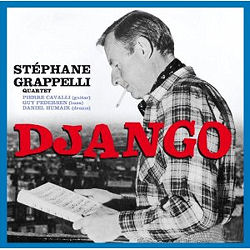1. Django
2. Nuages
3. Alabamy Bound
4. You Better Go Now
5. Le Tien
6. Like Someone in Love
7. Minor Swing
8. Daphne
9. Soft Winds
10. Makin' Whoopee
11. How About You?
12. Pent-Up House
13. Swing 39
14. Belleville
15. Manoir de mes Rêves
16. Djangology
17. Oui pour vous Revoir
18. Nuages
19. How High the Moon
20. Parisian Thoroughfare
21. Nuages
Stéphane Grappelli - Violin
Pierre Cavalli - Guitar (tracks 1-12)
Guy Pedersen - Bass (tracks 1-12)
Daniel Humair - Drums (tracks 1-12)
Henri Crolla - Guitar (tracks 13-16)
Emmanuel Soudieux - Bass (tracks 13-17)
Baptiste "Mac Kac" Reiulles - Drums (tracks 13-16)
Joseph Reinhardt, Roger Chaput - Guitars (track 17)
Georges Arvanitas - Piano (tracks 18-19)
Gilbert "Bibi" Rovere - Bass (tracks 18-19)
Charles Bellonzi - Drums (tracks 18-19)
René Urtreger - Piano (tracks 20-21)
Jean-Marie Ingrand - Bass (tracks 20-21)
Kenny Clarke - Drums (tracks 20-21)
"My life started when I met Django. Before him, I was a musician
playing here, playing there, but I realised when I was with Django,
we could produce something special". Stéphane Grappelli was a
street musician when he met Django Reinhardt in 1930, and they eventually
formed the quintet which in 1934 became the Quintet of the Hot Club
of France. Stéphane would probably have become famous without the
Hot Club but it was the association with Django which brought him
almost instant fame.
This album might be regarded as a tribute to Reinhardt, and it opens
with the tribute to Django which John Lewis wrote for the Modern Jazz
Quartet in the mid-fifties. Grappelli performs it with heart-rending
sincerity. The original album was recorded and released in 1962, but
this reissue includes nine bonus tracks. Tracks 13 to 16 were recorded
in 1954 and they were all composed by Django, who had died the previous
year. Track 17 was recorded in 1947, tracks 18 and 19 in 1961, and
tracks 20 and 21 in 1960. The last four tracks all come from live
sessions. One can excuse the three versions of Nuages, as
it was Django's most famous and perhaps most beautiful composition.
One criticism of the Hot Club I always had was that their sound could
become stodgy, because of the preponderance of stringed instruments
(violin, guitars and double bass). However, this album avoids stodginess
by using just one guitar (or a piano) with bass and drums on all but
track 17. Pierre Cavalli contributes several fine solos on what sounds
like an electric guitar, and there are short but good drum solos from
Daniel Humair on such tracks as Minor Swing and Soft
Winds.
However, as expected, the main soloist is Stéphane Grappelli, the
epitome of French elegance and romance. His playing is so polished
and inventive that it's very hard to say much about him beyond
"Perfect!" To take just one track as an example, listen
to how he bends notes to add extra feeling to How About You?
and how he swaps swinging fours with Pierre Cavalli.
Of the bonus tracks, Manoir de mes Rêves is one of Django
Reinhardt's most lyrical compositions; Oui pour vous Revoir
features Django's brother Joseph; and the last four tracks
include some good work by pianists Georges Arvanitas and René Urtreger
despite the echoey live recording. All in all, this album offers more
than 78 minutes of beautiful music.
Tony Augarde
www.augardebooks.co.uk
